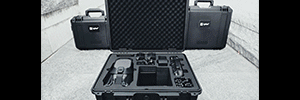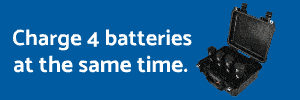I saw it discussed one one of those everything you you to know about the DJI Go 4 software. I just hooked everything up but I can't seem to find it anywhere in battery settings. I'll be flying to Ireland in a few months and I've already got the recommended LiPo safety bags but, it would seem to make sense that I should fly with uncharged batteries as well. Is there a way for me to make sure that the batteries are pretty well discharged before I get on a plane or is that something I don't need to worry about because I have the bags?
You are using an out of date browser. It may not display this or other websites correctly.
You should upgrade or use an alternative browser.
You should upgrade or use an alternative browser.
Is "Time to Discharge" the intelligent Mavic 2 batteries "still a thing"?
- Thread starter Jimck9
- Start date
BD0G
Well-Known Member
The Mavic Pro 2 is set to automatically discharge the batteries after 10 days. It is no longer user selectable as it was for the Original Mavic Pro.
The bags will suffice to contain any issues with the batteries as well. Make sure that the batteries are stowed in the overhead bins with carry on luggage and not placed in any check in luggage.
The bags will suffice to contain any issues with the batteries as well. Make sure that the batteries are stowed in the overhead bins with carry on luggage and not placed in any check in luggage.
DanielSan
Member
You can either allow the batteries to discharge themselves automatically, (the process starts after 10 days of the batteries being unused, and takes 3-4 days to complete,) or you could manually discharge the batteries by hovering your drone in a backyard / parking lot until they get low enough to travel, (I think it has to be lower then 30%.)
Hope this helped!
Hope this helped!
- Joined
- Oct 12, 2016
- Messages
- 28,318
- Reactions
- 31,153
- Location
- Harrisburg, PA (US)
- Site
- mavichelp.com
There's no need to attempt to discharge the batteries before flying. Airlines don't require batteries to be discharged.it would seem to make sense that I should fly with uncharged batteries as well
DanielSan
Member
There's no need to attempt to discharge the batteries before flying. Airlines don't require batteries to be discharged.
There is no "Requirement" by airlines, but it is HEAVILY suggested by both the airlines, and Dji.
Speedmeister
Well-Known Member
- Joined
- Aug 28, 2018
- Messages
- 171
- Reactions
- 92
- Age
- 59
- Joined
- Oct 12, 2016
- Messages
- 28,318
- Reactions
- 31,153
- Location
- Harrisburg, PA (US)
- Site
- mavichelp.com
That statement by DJI is confusing. I'm not sure what they recommend it.There is no "Requirement" by airlines, but it is HEAVILY suggested by both the airlines, and Dji.
Got a link to where airlines are suggesting batteries be discharged?
just check with your airline if they have any ruling with regards to batteries in transit at least that way you wont get any nasty surprises at the check in desk that could stop you taking your mav on holiday
DanielSan
Member
That statement by DJI is confusing. I'm not sure what they recommend it.
Got a link to where airlines are suggesting batteries be discharged?
Well, most major airlines recommend any batteries of any type to be either fully, or partially discharged while in transit, and the Dji Quote can be found in the User's Manual of both MP2 and MPZ Drones.
- Joined
- Oct 12, 2016
- Messages
- 28,318
- Reactions
- 31,153
- Location
- Harrisburg, PA (US)
- Site
- mavichelp.com
Agreed. Fully or partially discharged is fine. There's no need to attempt to discharge the battery down to a certain level though.most major airlines recommend any batteries of any type to be either fully, or partially discharged while in transit
Right -- I'm fully aware of said quote. The recommendation still doesn't make sense though since airlines don't require it and there is no benefit to attempting to discharge the batteries to a certain level prior to flying.the Dji Quote can be found in the User's Manual of both MP2 and MPZ Drones
Right -- I'm fully aware of said quote. The recommendation still doesn't make sense though since airlines don't require it and there is no benefit to attempting to discharge the batteries to a certain level prior to flying.
It makes sense to discharge a battery before departure, to ensure any risk transporting batteries is reduced. It's important to note that while discharging batteries makes them safer to travel with, it does not make them 100% safe, so it's better to ensure they are transported in applicable protective packaging/cases.
DJI ship their batteries with a partial charge especially for shipping.
The idea behind discharging before travelling is that a discharged battery is less volatile than a fully charged one. So if something were to go wrong, the discharged battery has less energy to go "Nuclear" on a plane so to speak.
For the benefit of others, think of your battery as a balloon for example.....
Fully inflated balloon = Louder bang when popped.
Partially deflated balloon (say 30%) = Quieter when popped.
The deflated balloon has less energy to expel, and less likely to cause damage.
There was a flight restriction on the Samsung Galaxy Note a few years ago. Airlines were asking passengers to turn off the phone for the duration of the flight, and especially NOT to charge while flying.
i think we can all agree that flying with a fully charged battery is not the best idea anything from 25 to 60 per cent is ok and of course use a lipo bag to lesson the harm if the battery should happen to ignite. has there been any research with regards to lipos being carried in the cargo hold of the plane due to altitude
- Joined
- Oct 12, 2016
- Messages
- 28,318
- Reactions
- 31,153
- Location
- Harrisburg, PA (US)
- Site
- mavichelp.com
Do you also discharge your laptop, phone, and whatever other electronic devices you take with you when flying? Most people don't. In fact, they are likely making sure those electronics are fully charged (and even charging them while flying) so they can be used. And as you probably know, batteries are most volatile while charging.The idea behind discharging before travelling is that a discharged battery is less volatile than a fully charged one. So if something were to go wrong, the discharged battery has less energy to go "Nuclear" on a plane so to speak.
If airlines and/or the FAA have no such requirement, then that must mean said danger is nothing but an urban legend. Will you hurt your batteries by being baited into that urban legend? Of course not. However, you might waste a lot of time if you're traveling by plane often.
And for good reason too. The battery in that device was known to catch on fire. That cannot be said for DJI batteries (or most other electronic devices).There was a flight restriction on the Samsung Galaxy Note a few years ago
ff22
Well-Known Member
Besides urban legends....
When not being actively charged and their electrical contacts are not, well, contacted, are Lipo batteries more prone to explode or ignite when fully charged or fully depleted or anywhere in between? Isn't it the chemistry/constituents that are explosive or prone to ignition? I remember "playing" with lithium in chemistry lab - almost as much fun as magnesium shavings.
When not being actively charged and their electrical contacts are not, well, contacted, are Lipo batteries more prone to explode or ignite when fully charged or fully depleted or anywhere in between? Isn't it the chemistry/constituents that are explosive or prone to ignition? I remember "playing" with lithium in chemistry lab - almost as much fun as magnesium shavings.
Congoblue
Well-Known Member
It's not the individual chemical constituents of the battery that are the cause of fire, it is the energy stored in them due to the battery charge.
If a battery is damaged or shorted, then it is more likely to catch fire if it is fully charged - the energy in the battery turns into heat. So in that respect it is better not to have them charged. The Note batteries were catching fire due to a partial short within the battery because they tried to make too high a capacity in too small a space which required very tight manufacturing tolerances to avoid shorts.
However lipo batteries are damaged by being fully discharged, and don't like being stored with low charge. They are best stored at 50% charge which is presumably why DJI automatically discharge them to that level.
If a battery is damaged or shorted, then it is more likely to catch fire if it is fully charged - the energy in the battery turns into heat. So in that respect it is better not to have them charged. The Note batteries were catching fire due to a partial short within the battery because they tried to make too high a capacity in too small a space which required very tight manufacturing tolerances to avoid shorts.
However lipo batteries are damaged by being fully discharged, and don't like being stored with low charge. They are best stored at 50% charge which is presumably why DJI automatically discharge them to that level.
There is no "Requirement" by airlines, but it is HEAVILY suggested by both the airlines, and Dji.
The fact is that no airline recommends discharging before flight.Well, most major airlines recommend any batteries of any type to be either fully, or partially discharged while in transit, and the Dji Quote can be found in the User's Manual of both MP2 and MPZ Drones.
Neither do the FAA, CAA, or other air safety authorities.
It's only in forums like this that the myth gets spread.
Like @msinger says, if it was a thing, you would see the safety scanners at the airport checking every laptop, mobile phone, camera, iPad etc to make sure their lithium batteries were discharged (and you don't)
But you do see planes with power outlets to keep your sevices charged on long flights!!
As for DJI's recommendation ....
DJI documentation is sprinkled with misinformation and this is a classic example.
According to their Mavic 2 Intelligent Flight Battery Safety Guidelines ...
Travel Notice
1. Before carrying the batteries on an airline flight, they must first be discharged to a battery level lower than 30%
Extensive searching doesn't show any airline in the world asking for this.
The only place I find any mention of it is here in the IATA's guidance document for shipping lithium batteries as air cargo:
https://www.iata.org/whatwedo/cargo/dgr/Documents/lithium-battery-guidance-document-2017-en.pdf
The International Air Transport Association (IATA) is the international body that supports aviation with global standards for airline safety, security, efficiency and sustainability.
All airline lithium battery policies are based on the IATA standards.
And the IATA's guidelines for Passeneger Traveling With Lithium Batteries:
https://www.iata.org/whatwedo/cargo/dgr/Documents/passenger-lithium-battery.pdf
.... makes absolutely no mention of discharging batteries before traveling by plane.
ps .. no airline suggests Lipo bags either and no airport security checkin people are looking for battery charge levels or Lipo bags either.
It's all a forum myth.
CanadaDrone
Well-Known Member
- Joined
- May 9, 2018
- Messages
- 2,182
- Reactions
- 2,069
You don't need to discharge before boarding a plane. If that were the case, it would be the case with all lithium batteries people bring on planes (laptops, tablets, phones, wireless headphones etc.) And if it were even the slightest issue issue, airlines would be banning or checking charge percentage on every device, but they do neither. Same thing when they ask you to pit your phone in airplane mode - if it were the slightest issue, they would be confiscating every phone on every plane. Think about how tightly controlled airline safety regulations are - if it were even the tiniest issue, they wouldn't leave it up to the passenger's discretion.
Virtually every airline now even provides power ports so that every passenger has 100% charge on their lithium battery powered phones/laptops/tablets/etc. at all times during the flight - and leaving a device on a charger at 100% is probably the most common way to cause a problem.
And you definitely don't want to have your battery really low or at zero percent for the flight, especially after a long flight that would be horrible for the battery.
If it's a short flight and you're flying right away when you land, go ahead and charge them to 100%. If not, then they are probably at 50-70% already anyway because that is where they should be when not in use, which is perfect.
I use LiPo bags for my own reasons (they are so cheap why not) but I've barely even met a security agent who knows what they are looking at. Airport security is just theater anyway - play by the rules and you're fine.
Virtually every airline now even provides power ports so that every passenger has 100% charge on their lithium battery powered phones/laptops/tablets/etc. at all times during the flight - and leaving a device on a charger at 100% is probably the most common way to cause a problem.
And you definitely don't want to have your battery really low or at zero percent for the flight, especially after a long flight that would be horrible for the battery.
If it's a short flight and you're flying right away when you land, go ahead and charge them to 100%. If not, then they are probably at 50-70% already anyway because that is where they should be when not in use, which is perfect.
I use LiPo bags for my own reasons (they are so cheap why not) but I've barely even met a security agent who knows what they are looking at. Airport security is just theater anyway - play by the rules and you're fine.
dylanm
Member
- Joined
- Mar 2, 2019
- Messages
- 6
- Reactions
- 3
Getting ready to travel with my Mavic Pro 2 and I have 3 batteries. Does anyone know if the airlines or TSA limit the number of batteries we can travel with? I am also traveling with my digital camera and 2 batteries for it. I haven't encountered issues with the camera ( a Fuji X series camera with small Li Ion batteries ). Thanks for the help. I am doing a road trip with my dad on Route 66 and really want to get some video especially in the western states, so I want to have the drone with me for the trip.
ff22
Well-Known Member
Getting ready to travel with my Mavic Pro 2 and I have 3 batteries. Does anyone know if the airlines or TSA limit the number of batteries we can travel with? I am also traveling with my digital camera and 2 batteries for it. I haven't encountered issues with the camera ( a Fuji X series camera with small Li Ion batteries ). Thanks for the help. I am doing a road trip with my dad on Route 66 and really want to get some video especially in the western states, so I want to have the drone with me for the trip.
I have not seen any policy like that. While I'm sure some folks have even more STUFF, I've had laptop, cellphone, camera (three batteries), kindle, two power banks, Bose headphones and enough wires, cables and ac adapters to open my own electronics store. I admit that I have not taken my Zoom on a flight and fear that if and when I do, my carry-on will definitely exceed limits. My daypack has not really fit under the seat in front of me in years.
Similar threads
- Replies
- 4
- Views
- 724
- Replies
- 1
- Views
- 995
- Replies
- 0
- Views
- 1K
- Replies
- 6
- Views
- 419
- Replies
- 8
- Views
- 1K
DJI Drone Deals
1. Mini 2
2. Mini 3 Pro
3. Mini 4 Pro
4. Air 2s
5. Air 3
6. Avata 2
7. Mavic 3 Pro
8. Mavic 3 Classic
2. Mini 3 Pro
3. Mini 4 Pro
4. Air 2s
5. Air 3
6. Avata 2
7. Mavic 3 Pro
8. Mavic 3 Classic
New Threads
-
-
-
-
Hello everyone! New aspiring drone pilot here, from Portugal.
- Started by Rui S
- Replies: 5











